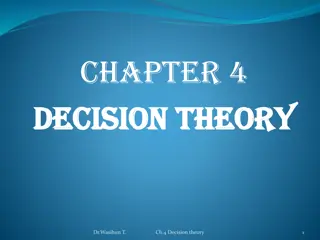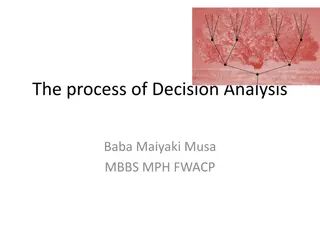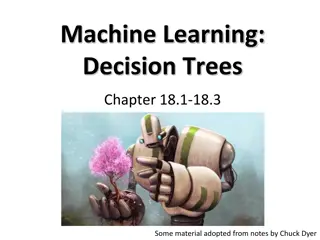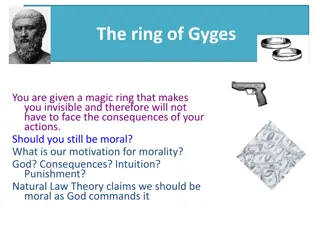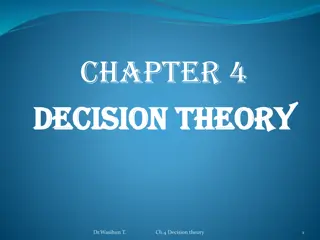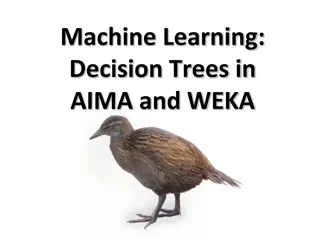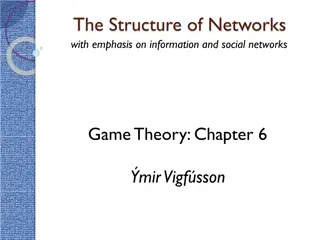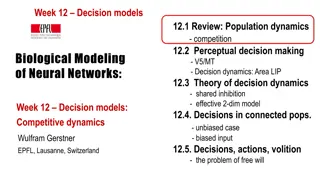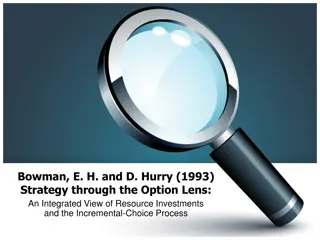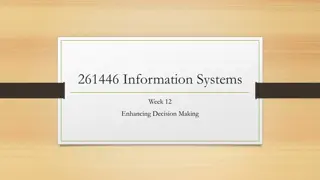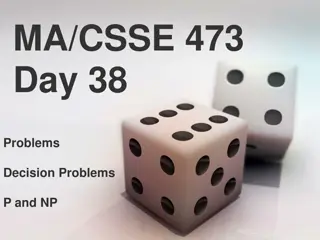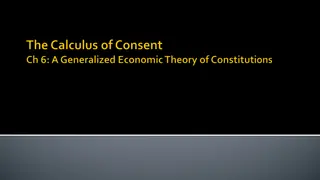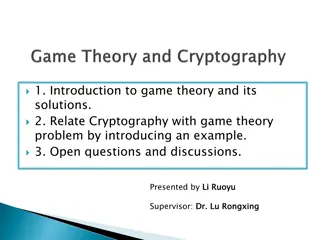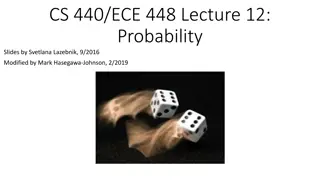Ginzburg Landau phenomenological Theory
The Ginzburg-Landau phenomenological theory explains superconductivity and superfluidity as distinct thermodynamic phases. It focuses on phase transitions characterized by singularities in specific heat at the transition temperature. Derived from BCS theory, it quantifies condensation energy, emphas
1 views • 38 slides
Crystal Field Theory in Transition Metal Complexes
Crystal Field Theory (CFT) explains the colors and magnetic properties of transition metal complexes. It focuses on the energy changes in d-orbitals of metal ions caused by surrounding ligands. This theory, developed in 1929, provides insights into the bonding interactions in complex compounds. The
10 views • 44 slides
Understanding Brain Development and Decision-Making Skills
Explore the fascinating realm of brain development and decision-making skills, focusing on how different brain regions activate during decision-making, the evolution of decision-making abilities from adolescence to adulthood, the importance of practicing decision-making skills, and the influence of
6 views • 10 slides
Evolution of Mathematical Theories and Proof Systems
Development of mathematical theories such as model theory, proof theory, set theory, recursion theory, and computational complexity is discussed, starting from historical perspectives with Dedekind and Peano to Godel's theorems, recursion theory's golden age in the 1930s, and advancements in proof t
1 views • 29 slides
Understanding Decision Theory in Business: A Comprehensive Overview
Decision theory in business involves making choices based on organizational objectives like profit maximization or cost minimization under conditions of uncertainty. This chapter covers key components such as alternatives, states of nature, payoffs, degree of certainty, and decision criteria. It exp
1 views • 41 slides
Enhancing Career Decision Making Process
Explore the importance of good decision-making, types of decision makers, problems faced in decision making, readiness factors for career decisions, decision-making processes, and the CASVE cycle. Understand the significance of effective decision-making skills and how they impact our lives.
0 views • 26 slides
Psychological Theories of Criminality: Understanding the Roots
Psychological theories of criminality delve into the association between intelligence, personality, learning, and criminal behavior. Major theories include Psychodynamic Theory by Freud, Behavioral Theory by Bandura, and Cognitive Theory by Kohlberg. These theories explore how unconscious mental pro
1 views • 20 slides
Understanding the Theory of Firms: Neoclassical vs. Modern Approaches
The theory of firms is explored through the Neoclassical and Modern perspectives. Neoclassical theory focuses on profit maximization, while Modern theory delves into managerial, principal-agent, and transaction cost theories. The discussion covers criticisms of Neoclassical theory and the essential
1 views • 79 slides
Understanding Decision Analysis in Work-related Scenarios
Decision analysis plays a crucial role in work-related decision-making processes, helping in identifying decision makers, exploring potential actions, evaluating outcomes, and considering various values involved in the decision. This module delves into the steps involved in decision analysis, provid
0 views • 76 slides
Understanding Decision Trees in Machine Learning
Decision trees are a popular supervised learning method used for classification and regression tasks. They involve learning a model from training data to predict a value based on other attributes. Decision trees provide a simple and interpretable model that can be visualized and applied effectively.
1 views • 38 slides
Theories of Causation in Psychological and Social Sciences
Overview of theories of causation categorized into psychological, social psychological, and sociological perspectives. Psychological theories focus on instinctive, biological, and psychological qualities of abusers, including Attachment Theory, Psychodynamic Theory, Social Learning Theory, and Situa
0 views • 15 slides
Understanding Political Theory through a Contextual Approach
Exploring G.H. Sabine's perspective on political theory through a contextual approach, emphasizing the importance of historical context and societal influences. Sabine argues that while political theory evolves with its contemporary politics, it should be analyzed within its specific time and social
0 views • 9 slides
Comprehensive Guide to Decision Making and Creative Thinking in Management
Explore the rational model of decision-making, ways individuals and groups make compromises, guidelines for effective decision-making and creative thinking, utilizing probability theory and decision trees, advantages of group decision-making, and strategies to overcome creativity barriers. Understan
0 views • 30 slides
Understanding Natural Law Theory: Morality and Divine Commands
Natural Law Theory, influenced by thinkers like St. Thomas Aquinas and Aristotle, posits that morality is derived from rational thought and divine commands. The theory emphasizes the importance of following moral absolutes to establish a right relationship with God and achieve eternal life. By study
1 views • 36 slides
Evolution of Light Theory: From Wave Theory to Quantum Theory
At the turn of the century, the discovery of the photoelectric effect challenged the wave theory of light, leading to the development of the quantum theory by Max Planck and Albert Einstein. This new theory introduced the concept of discrete energy units known as quanta, bridging the gap between wav
1 views • 62 slides
Understanding the Decision-Making Process
Decision-making is the process of selecting the best course of action from multiple alternatives to achieve desired outcomes. It involves identifying decisions, gathering relevant information, and following a step-by-step process to make informed choices. Principles and steps like identifying the de
0 views • 31 slides
Introduction to Decision Theory in Business Environments
Decision theory plays a crucial role in business decision-making under conditions of uncertainty. This chapter explores the key characteristics of decision theory, including alternatives, states of nature, payoffs, degree of certainty, and decision criteria. It also introduces the concept of payoff
0 views • 41 slides
Understanding Decision Trees in Machine Learning with AIMA and WEKA
Decision trees are an essential concept in machine learning, enabling efficient data classification. The provided content discusses decision trees in the context of the AIMA and WEKA libraries, showcasing how to build and train decision tree models using Python. Through a dataset from the UCI Machin
3 views • 19 slides
Dp-branes, NS5-branes, U-duality, and M-Theory Overview
Overview of Dp-branes, NS5-branes, and U-duality derived from nonabelian (2,0) theory with Lie 3-algebra. Introduction to M-theory, including M2-branes and M5-branes in the strong coupling limit. Discussion on BLG theory, Lorentzian Lie 3-algebra, and the ABJM theory for M2-branes.
1 views • 32 slides
Understanding Time-Independent Perturbation Theory in Quantum Mechanics
Perturbation theory is a powerful tool in solving complex physical and mathematical problems approximately by adjusting solutions from a related problem with known solutions. This theory allows for more accurate approximate solutions by treating the difference as a small perturbation. An example inv
0 views • 19 slides
Ethical Theories: Divine Command vs. Virtue Theory Explained
Divine Command Theory asserts that morality is derived from God's commands, contrasting with Virtue Theory which focuses on developing moral virtues to achieve human flourishing and excellence. Divine Command Theory relies on religious texts, while Virtue Theory emphasizes the cultivation of virtues
0 views • 24 slides
Understanding Fermi Liquid Theory in Interacting Fermion Systems
Fermi liquid theory, also known as Landau-Fermi liquid theory, is a theoretical model that describes the normal state of metals at low temperatures. Introduced by Landau and further developed by Abrikosov and Khalatnikov, this theory explains the similarities and differences between interacting ferm
0 views • 23 slides
Understanding Game Theory in Networks
Exploring the concept of game theory within networks, focusing on decision-making, behaviors, and outcomes of interactions among interconnected agents. Game theory sheds light on various scenarios like pricing strategies, international relations, and evolutionary dynamics, offering insights into str
0 views • 31 slides
Should Assisted Suicide be Legalized in China? Decision-making with Six Thinking Hats
The content discusses the decision-making process using the Six Thinking Hats method to determine whether assisted suicide should be legalized in China. Various tools and sessions are highlighted, guiding participants through considering different viewpoints, analyzing arguments, and making an infor
0 views • 12 slides
The Assisted Decision-Making (Capacity) Act 2015 in the Criminal Justice Context
The Assisted Decision-Making (Capacity) Act 2015 introduces key reforms such as the abolition of wards of court system for adults, a statutory functional test of capacity, new guiding principles, a three-tier framework for support, and tools for advance planning. It emphasizes functional assessment
0 views • 17 slides
Implementing Group Decision-Making Tools with Voting Procedures at Toulouse E-Democracy Summer School
Decision-making in organizations is crucial, and group decision-making can lead to conflicts due to differing views. Group Decision Support Systems (GDSS) are essential for facilitating decision-making processes. The Toulouse E-Democracy Summer School discusses the implementation of voting tools in
0 views • 21 slides
Computational Learning Theory: An Overview
Computational Learning Theory explores inductive learning algorithms that generate hypotheses from training sets, emphasizing the uncertainty of generalization. The theory introduces probabilities to measure correctness and certainty, addressing challenges in learning hidden concepts. Through exampl
0 views • 43 slides
Automata Theory and Theory of Computation Overview
This course overview covers concepts in automata theory and theory of computation, including formal language classes, grammars, recognizers, theorems in automata theory, decidability, and intractability of computational problems. The Chomsky hierarchy, interplay between computing components, modern-
0 views • 42 slides
Exploring Decision Models in Neural Networks: Population Dynamics, Perceptual Decision Making, and Theory
Dive into the world of decision models in neural networks with a focus on population dynamics and competition, perceptual decision making with V5/MT involvement, and the theory of decision dynamics including shared inhibition and effective 2-dim models.
0 views • 46 slides
Theories of Interest in Microeconomics II
Explore various theories of interest in economics, including the Classical Theory, Liquidity Preference Theory by Keynes, Productivity Theory, Abstinence Theory, Time-Preference Theory, Fisher's Time Preference Theory, and the Loanable Fund Theory. These theories offer different perspectives on the
0 views • 6 slides
Decision Analysis: Problem Formulation, Decision Making, and Risk Analysis
Decision analysis involves problem formulation, decision making with and without probabilities, risk analysis, and sensitivity analysis. It includes defining decision alternatives, states of nature, and payoffs, creating payoff tables, decision trees, and using different decision-making criteria. Wi
0 views • 27 slides
Exploring the Evolution of Atomic Theory
Delve into the historical journey of atomic theory starting from Democritus and Aristotle's views to modern advancements proving some aspects of Dalton's theory incorrect. Learn about key laws and theories such as the Particle Theory of Matter, Dalton's Atomic Theory, and JJ Thomson's discoveries, s
0 views • 30 slides
Integrating Real Options Theory in Strategic Decision Making
This paper explores the application of Real Options Theory in strategic decision-making processes within organizations. It discusses how organizations can use options contracts to keep strategic opportunities open in the face of uncertainty, emphasizing the importance of recognizing and leveraging t
0 views • 9 slides
Decision Making Under Uncertainty Using Decision Trees
In this scenario, Colaco faces the decision of whether to conduct a market study for their product, Chocola. The decision involves potential national success or failure outcomes, along with the consequences of a local success or failure from the market study. By utilizing decision trees, this comple
10 views • 7 slides
Enhancing Decision Making with Information Systems
Explore the role of information systems in enhancing decision-making processes within organizations. Topics include business intelligence, types of decisions, decision-making processes, and managerial roles. Learn about structured, unstructured, and semi-structured decisions, different models of man
0 views • 21 slides
Understanding Decision Problems in P and NP Complexity Classes
Decision problems play a crucial role in the realm of computational complexity theory, defining questions with binary answers that form the basis of the P and NP classes. This article delves into the significance of polynomial-time algorithms, distinguishes between tractable and intractable problems
0 views • 32 slides
Decision Making and Constitutional Rules Behind the Veil of Ignorance
In decision-making for collective actions, individuals behind a veil of ignorance need constitutional rules to govern future decisions. The choice of rules, the expected external costs, and decision-making costs play a crucial role in determining the optimal decision-making rule. By minimizing total
0 views • 16 slides
Understanding Game Theory and Its Application in Cryptography
Game theory involves analyzing conflicts and cooperation among decision-makers, providing mathematical models for decision-making. By relating cryptography to game theory, we can see how rational agents make choices to maximize utility. The example of the Prisoner's Dilemma highlights strategic deci
0 views • 38 slides
Macromechanical Analysis of Lamina and Tsai-Hill Failure Theory Overview
The Tsai-Hill failure theory is based on the strengths of a unidirectional lamina, incorporating longitudinal and transverse tensile and compressive strengths, as well as in-plane shear strength. This theory, derived from the distortion energy theory, provides criteria for determining lamina failure
0 views • 15 slides
Understanding Probability and Decision Making Under Uncertainty
Probability theory plays a crucial role in decision-making under uncertainty. This lecture delves into key concepts such as outcomes, events, joint probabilities, conditional independence, and utility theory. It explores how to make decisions based on probabilities and expected utility, highlighting
0 views • 34 slides




